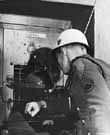
|
|
|

|

|

|

|
|
Click on an image to see a larger, more detailed picture.
|
|
|
|
|
| 1945: Liberation and Rebuilding |

|
pg. 636 |

|
|
|
|
| |
 An American military policeman looks into the cell of Hermann Göring, the most prominent prisoner at the Nuremberg city jail. Because the Allies feared that the indicted Nazi leaders would try to cheat the hangman by doing themselves in, the prisoners were under a constant suicide watch. Hitler, Joseph Goebbels, and Heinrich Himmler had all killed themselves rather than face justice. Göring would indeed commit suicide, on October 14, 1946, with cyanide that he had skillfully concealed for months, or that was slipped to him by persons unknown.
An American military policeman looks into the cell of Hermann Göring, the most prominent prisoner at the Nuremberg city jail. Because the Allies feared that the indicted Nazi leaders would try to cheat the hangman by doing themselves in, the prisoners were under a constant suicide watch. Hitler, Joseph Goebbels, and Heinrich Himmler had all killed themselves rather than face justice. Göring would indeed commit suicide, on October 14, 1946, with cyanide that he had skillfully concealed for months, or that was slipped to him by persons unknown.
Photo: United States Holocaust Memorial Museum Photo Archive / National Archives
|
 In November 1945 at Nuremberg, in a cell beneath the dining room of American war-crimes investigators, German Colonel Joachim Peiper could smell Thanksgiving dinner. Peiper had been accused of failing to prevent the massacre of 86 unarmed American servicemen captured at Malmédy, Belgium, in 1944. Because prisoner rations at Nuremberg were modest, Peiper let it be known he would work for whatever Thanksgiving food might be left over. The American officers agreed--on the condition that Peiper don a suit and work as their waiter. Here, the humbled colonel serves his captors. Peiper was rewarded with leftovers, but was transferred the next day to the Allied facility at Dachau, Germany, for further interrogation. Although sentenced to death in 1946, Peiper was released from prison ten years later.
In November 1945 at Nuremberg, in a cell beneath the dining room of American war-crimes investigators, German Colonel Joachim Peiper could smell Thanksgiving dinner. Peiper had been accused of failing to prevent the massacre of 86 unarmed American servicemen captured at Malmédy, Belgium, in 1944. Because prisoner rations at Nuremberg were modest, Peiper let it be known he would work for whatever Thanksgiving food might be left over. The American officers agreed--on the condition that Peiper don a suit and work as their waiter. Here, the humbled colonel serves his captors. Peiper was rewarded with leftovers, but was transferred the next day to the Allied facility at Dachau, Germany, for further interrogation. Although sentenced to death in 1946, Peiper was released from prison ten years later.
Photo: Drew University Center for Holocaust Study
|
 Robert H. Jackson
Robert H. Jackson
Head of the prosecutorial team at the Nuremberg International Military Tribunal, American Robert H. Jackson brought a wealth of judicial experience to his duties. Widely respected for his integrity, Jackson served in the Roosevelt administration--first as solicitor general and later as attorney general--before being appointed to the Supreme Court. President Harry Truman chose him to represent the U.S. in the trials, granting him the rank of lieutenant-general in the Army. An eloquent spokesman for those who had suffered under Nazi rule, Jackson argued that the plaintiff in the case against the Nazi leaders was no single nation, nor even the Allies jointly. The complainant was, in fact, "civilization." In his closing speech at the trial, Jackson argued that a verdict of innocence would be tantamount to proclaiming that "there has been no war, there are no slain, there has been no crime."
Photo: John W. Mosenthal / United States Holocaust Memorial Museum Photo Archive
|
|

|

|

|

|
 December 1945: Antisemitic Poles murder 11 Jews in the town of Kosow-Lacki, Poland, which is located less than six miles from the site of the Treblinka extermination camp.
December 1945: Antisemitic Poles murder 11 Jews in the town of Kosow-Lacki, Poland, which is located less than six miles from the site of the Treblinka extermination camp.
|
 December 1945: Oliver Cox, an American sociologist, concludes that Christians in the United States regard the Jew as "our irreconcilable enemy within the gates, the antithesis of our God, the disturber of our way of life and of our social aspirations."
December 1945: Oliver Cox, an American sociologist, concludes that Christians in the United States regard the Jew as "our irreconcilable enemy within the gates, the antithesis of our God, the disturber of our way of life and of our social aspirations."
|
 December 22, 1945: The American Displaced Persons Act makes it easier for Nazi war criminals to immigrate to the United States. It particularly benefits Baltics, Ukrainians, and ethnic Germans--many of whom had engaged in a "high level of collaboration" with the Germans. The act discriminates against Jewish refugees. When the bill is debated, many congressmen and members of the Departments of State, Justice, and Interior express their anti-Jewish feelings indirectly and in private.
December 22, 1945: The American Displaced Persons Act makes it easier for Nazi war criminals to immigrate to the United States. It particularly benefits Baltics, Ukrainians, and ethnic Germans--many of whom had engaged in a "high level of collaboration" with the Germans. The act discriminates against Jewish refugees. When the bill is debated, many congressmen and members of the Departments of State, Justice, and Interior express their anti-Jewish feelings indirectly and in private.
|
|
|
|
|
| 1945: Liberation and Rebuilding |

|
pg. 636 |

|
|
The Holocaust Chronicle
© 2009 Publications International, Ltd.
|
|
